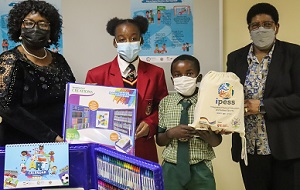
Ministries and stakeholders to develop policy on Integrated Physical Education and School Sport

The Ministry of Education, Arts and Culture (MEAC), the Ministry of Sport, Youth and National Service together with Deutsche Gesellschaft für Internationale Zusammenarbeit (GIZ) and other relevant stakeholders last week conducted a workshop to create a roadmap for the Integrated Physical Education and School Sports (IPESS) programme.
These stakeholders came together with the support of GIZ and are in the process of developing a policy on Integrated Physical Education and School Sport.
Physical education and school sports should be an intrinsic part of a school learner’s overall development and forms part of their healthy lifestyle.
The IPESS programme builds on the ‘sport for development’ concept that has already been rolled out and implemented successfully across the nation. The stakeholders that came together in the workshop pooled their creative resources to develop a marketing, media and communication strategy to engage learners, teachers, school officials, parents and the private sector, amongst others to stimulate and raise the interest and participation in physical education and school sports.
In recent years the emphasis in schools has been only on academic development, whilst school children of all ages have seen their physical education and school sports activities reduced to incidental activities. Leaving the learners with no outlet for their energy, but more importantly depriving them of the essential development that physical education and sports brings.
Development such as life skills, teamwork, learning how to deal with adversity, social development and interaction, gameplay as well as physical development and acquiring skills that will lead to a healthy lifestyle.
The stakeholders that took part in the workshop to find ways and means to engage the learners, teachers, parents, local and regional councils were represented some of the most important youth and sports organisations in Namibia. Namely NANSO, NSSU, UNICEF, Physically Active Youth (P.A.Y.), Basketball Artists School (BAS), Technical Basketball Academy (TBA) and an NGO from Omaheke region called Gobabis Youth Development Academy (GYDA) and school representatives.
As this programme is focused on creating a holistic approach of engagement with the youth, a few school learners were asked to be part of the workshop as their input and feedback is as important as any of the other stakeholders. Who better than the youth themselves to tell the stakeholders how to best communicate and really engage with them.
The workshop’s brief was to find a way in which to roll out the IPESS programme in the coming months across the 14 regions and to engage all the relevant stakeholders to participate in sporting
and physical educational activities.
After a full day of brainstorming and collaboration between the representatives of the different organisations; ministries as well as NGO’s, the exciting ideas will be worked out.
Ayesha Wentworth, Deputy Director at DATS, Ministry of Education said; “The ‘high’ concepts and ideas will be turned into practical and real activities for all the 14 regions. Engaging learners and teachers and all other stakeholders to make physical education and school sports an intrinsic part of every Namibian child’s life. Watch this space!”
Stakeholder consultations in all regions (except Erongo) were held in the past weeks with representatives from various sectors and backgrounds (ministries, communities, NGO’s, private sector, education and sport officers, NANTU, NANSO etc.). On 9 July the stakeholder consultation for Khomas region will be held.
The regional consultations will give an insight on the situation of physical education and school sports on the grounds. The outcome of theses consultations will form the basis for drafting and implementing the policy.












































